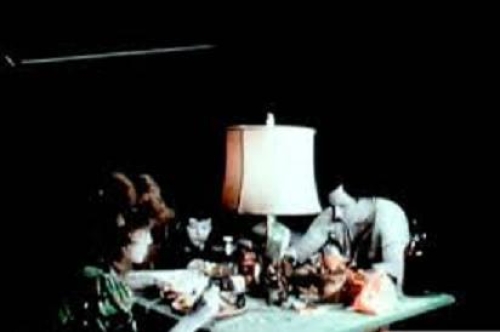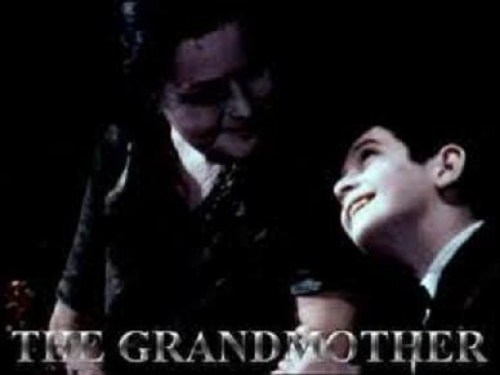
Yesterday I watched David Lynch's movie "Grandmother" of 1970. Philosophical approach opens an inner world of heroes without words. Animation was here too used.
The boy oppressed by despotic parents hears strange whistle on an attic and one of seeds in a bag appears its source.

The inscription on it "Seeds" has a shade of the theory of Hegel.
the Seed - the Germ -the Plant - the Tree the Letter - the Word - the Offer - the Text
Нaving brought not one bucket of the earth which the boy pours out on a bed and carefully sits down a sunflower seed, having plentifully watered from a garden watering can. The result doesn't keep itself waiting and quickly enough the tree grows. Once the boy sees that the tree was tumbled down,and someone tries to get out of its hollow bosom. . Having given help to the newcomer, the boy finds out that it is the grandmother dear and good-natured. She is very glad to the newly made grandson, and he in turn too - at last there was a kind soul with whom it is good and cozy.

Parents don't believe in existence of the grandmother, even when the boy plaintively assures that her medical care is necessary. But the father with mother only laugh at the son. Their emotional states are expressed in the form of shout, dog bark, growl and a squeal. At the very beginning of the movie even their habits are just as at dogs.
The final sad - the grandmother gets sick and dies. The grief of the grandson doesn't have a limit.
Remembering that, the Lynch's creativity should be perceived figuratively, I drew the following conclusions.
The grandmother who appeared from a tree which grew from a seed seeded on a bed - a symbol of deep germination of dream. From small to the great. It is not casual her exit from a hollow tree trunk, very reminding a metamorphosis of a doll in a butterfly is. The fact of that the seed was put in the earth which is generously scattered on a bed and plentifully irrigated with water leads to a conclusion that it could be the dream of the boy or his dream in reality. Trying to hide and be protected from a cruel situation in a family, the unfortunate child fails to the fantastic world where live only he and his kind grandmother. their location, the room on an attic, indicates a dream height.
Parents continue to offend and humiliate the son and at heart he hates them, being eager to revenge (animation shots). The grandmother gets sick and begins stridently, monotonously to whistle.
The boy vainly tries to help it (attempt to rescue dream) and runs to parents in hope for mercy, but those roughly humiliate it. Meanwhile the grandmother promptly moves about the room, continuing to whistle.
Then she dies and the boy goes on a cemetery. Here shots black-and-white, grief symbol. The grandmother sits on a chair, peering at the boy, as if trying to recognize him (internal identification of dream). It costs, having sadly hung the head that suggests an idea of memories of the destroyed dream who had to be buried.
Cemetery it is an allegory also, this is a place of burial of the broken dreams. The quantity of graves obviously means a quantity of subjects of dreams.
Вчера я посмотрела фильм Дэвида Линча "Бабушка" 1970 г. Философский подход раскрывает внутренний мир героев без слов. Здесь также использовалась анимация.
Мальчик, угнетаемый деспотичными родителями, слышит странный свист на чердаке и его источником оказывается одно из семян в мешке. Надпись на нём "Семена" имеет отттенок теории Гегеля.
Семя - Зародыш - Росток - Дерево Буква - Слово - Предложение - Текст
Наносив не одно ведро земли, которую мальчик высыпает на кровать и заботливо садит семечко, обильно полив водой из садовой лейки. Результат не заставляет себя ждать и довольно быстро вырастает дерево. Однажды мальчик видит, что дерево повалилось, а из его полого лона кто-то пытается вылезти. Оказав помощь пришельцу, мальчик обнаруживает, что это бабушка, милая и добродушная.Она очень рада новоиспеченному внуку, а он в свою очередь тоже -наконец-то появилась добрая душа, с которой хорошо и уютно. Родители не верят в существование бабушки, даже когда мальчик слёзно уверяет, что её необходима медицинская помощь. Но отец с матерью всего лишь смеются над сыном. Их эмоциональные состояния выражены в форме крика,собачьего лая, рычания и повизгивания. В самом начале фильма у них даже повадки совсем как у собак.
Финал печальный - бабушка заболевает и умирает. Горю внука нет предела.
Помня о том. что творчество Линча следует воспринимать в переносном смысле, я сделала следующие выводы. Бабушка, появившаяся из дерева, которое выросло из семени, посеянное на кровати - символ глубокого прорастания мечты. От малого до великого. Неслучайным является её выход из полого ствола дерева, весьма напоминающий метаморфозу куколки в бабочку. Факт того, что семя было посажено в земле, щедро рассыпанной на кровати и обильно орошённой водой, приводит к выводу, что это мог быть сон мальчика или его грёзы наяву. Пытаясь спрятаться и защититься от жестокой обстановки в семье, несчастный ребёнок проваливается в сказочный мир, где живут только он и его добрая бабушка. их местонахождение, комната на чердаке, указывает на возвышенность мечты.
Родители продолжают обижать и унижать сына и в глубине души он их ненавидит, горя желанием отомстить (анимационные кадры). Бабушка заболевает и начинает пронзительно, монотонно свистеть.
Мальчик тщетно пытается ей помочь (попытка спасти мечту) и бежит к родителям в надежде на милосердие, но те его грубо унижают. Тем временем бабушка стремительно перемещается по комнате, продолжая свистеть.
Потом она умирает и мальчик идёт на кладбище. Здесь кадры чёрно-белые, символ скорби. Бабушка сидит на стуле, всматриваясь в мальчика, как бы пытаясь узнать его ( внутренняя идентификация мечты). Он стоит, печально опустив голову, что наводит на мысль о воспоминаниях о разрушенной мечте, которую пришлось похоронить.
Кладбище - тоже аллегория, это место захоронения разбитых грёз. Количество могилок очевидно означает количество предметов мечтаний.

